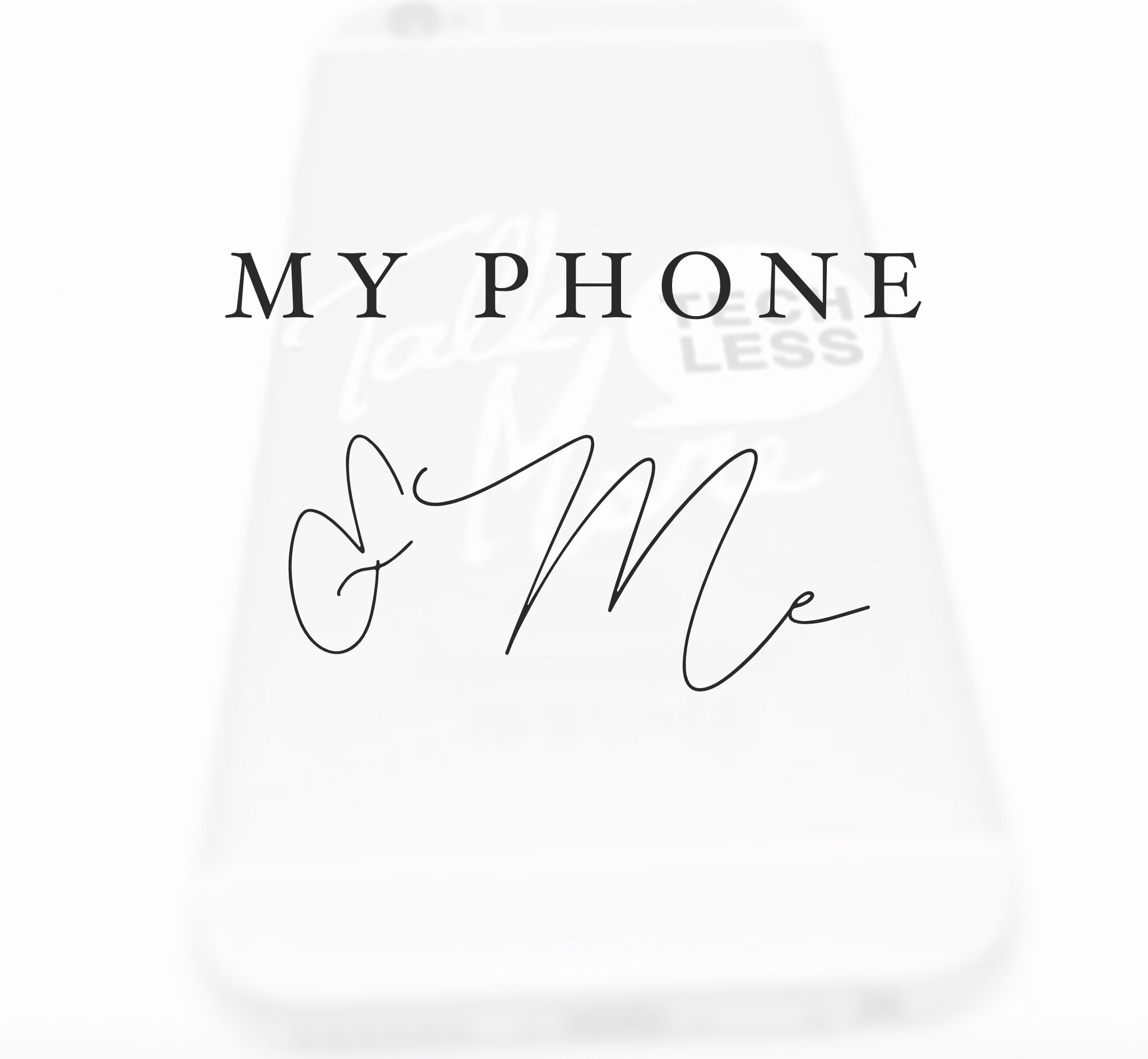"Nothing worth having comes easy" - Roosevelt
When I think about pain or friction or even grief I want to run hard in the other direction. I want to numb out. To escape into a bliss of positivity instead of facing what I need to face for my growth and for my health. Thankfully, over the years I'm learning a new way of accepting life is hard and good, welcoming grief, and acknowledging that I'm not on my own to walk this road. This view opens my eyes to truth all around, opens my heart to compassion, and leads me to action. I'm learning this in so many areas of my life, but here I want to get specific about my journey with my phone and what digital flourishing looks like for me.
I had my first cellphone at the end of college. It was an old flip phone. But let's skip on ahead because I left that one at home all the time and never really thought about it. Fast-forward five years and I was in love with my Motorola SLVR. I could listen to my ITunes 🎶 and get ahold of my husband, Matt, anytime I wanted. If I really had time, I could even text (that took a lot longer with the multi-tap old-school telephone keys). When our first son was born, I was a new mom and this thing called the Blackberry was in everyone's hands because you could access the Internet, including your email. I remember the day Matt and I went to the Richland Mall kiosk to buy our new Blackberry. We ate lunch and discussed how this would not change us. It wouldn't alter how we interacted with each other and we would not be super distracted by them all the time. Then, somewhat reluctantly and excited, we purchased them.
The rest is history!
I say that a little tongue-in-cheek, but it did change a lot. I had never owned anything that made my life that "easy." I could get in touch with anyone anywhere all of a sudden. And them me. I could work from anywhere at any time of the day or night. Even the design was, for the most part, flawless while giving me access to whatever I wanted. And we're not even to the iPhone yet! Once that hit our hands I was "tech neck" down, deep-diving into cyberspace.
Along with all the incredible things this type of technology gave us access to, I also began to see its pitfalls unfold before my eyes. Just like many of my fellow digital Immigrants (a person born or brought up before the widespread use of digital technology), I saw it change the kids we were working with. I saw it stealing their innocence, sleep, and time. I saw it change my relationships, my marriage, and even the way I parented my second son compared to my first. Like many of you, I had a love-hate relationship with my phone. How did I hold the tension?
What would healthy integration look like for me?
First of all, I had to go back to the beginning of knowing my relationship with pain and hard and grief and face that. I couldn't run. I couldn't numb the hurt with scrolling more, like anything else I used to numb. I had to face this. And I did. Additionally, on a global scale, I looked into what this was doing to society on the whole, as well as what it was doing to me. This was all well before there was anything called a Digital Wellness field or line of work.
Talk More Tech Less was organically born out of a lonely place inside me.
Done with numbing any more pain and with eyes to see the pain in others around me, I had to do something about it.
I started with Matt's outdoor mentorship organization, Field Guides, and the kids he was reaching. I worked with friends, family, organizations I was connected to, and the community around me to help set the vision and build something called a Detox Box for our phones. As a former teacher, I started to reach out to schools and community groups to talk about online safety. I built a website to get the word out and sell awareness apparel and products. I failed and got back up a lot. And most importantly, I started to make changes in my own phone habits, using friction.
When I thought about the idea of creating friction with my easy-to-use phone, I didn't want to jump on it right away. Of course, I didn't. Remember my resistance to hard things? I told myself, I could have easy and still create good boundaries. Well, that doesn't work when it comes to brain hacking. See the Social Dilemma on Netflix.
Don't just take it from me. Look at the data of what the ease and allure of our phone design is doing to us as a whole. We're spending more time on it, spending more money on it, and it's lowering our quality of life, causing higher rates of depression and anxiety the more we are on our screens. In April, the Brain Institute at the University of Pittsburg released the findings of a recent study to the journal, Computers in Human Behavior. The authors determined that users of multiple social media sites, such as Facebook, YouTube, Twitter, Google Plus, Instagram, Snapchat, Reddit, Tumblr, Pinterest, Vine, and LinkedIn raised the participant’s depression and anxiety risks compared to their peers not using as many sites and not on as often. The way we use our phones and the time we spend on them directly impacts our mental health.
So, why not do something about it?
Here is a definition of friction that I think directly relates to this idea with our phones: Friction is a great measure of opposition to motion.
Tech companies remove design friction to get you to convert to a customer.
While this does make your experience on your phone easier and potentially less time-consuming on the specific task at hand, it isn't necessarily in your best interest. Let's face it, if it's not going to be a quick and easy transaction, we won't spend the time making the purchase, unless it's really important to us. But making it easy means we work less for it and buy more often. Many times we end up with things we didn't even know we wanted.
Converting you from a user to a customer is the ultimate goal of the attention economy. It's why AI is learning us. And the truth is, with the way our devices are designed, we are always a customer. Even if we're simply watching, we're consuming content and it is learning us.
Now I'm not trying to say we all need to go back to my Motorola SLVR, although, some digital minimalists would suggest that. We create positive friction to work FOR our well-being. The idea is to get to the point that you are enjoying your device, flourishing when using it, and coming out of your time on your phone feeling well. To get to this healthier place, something has to give.
There is no growth without a disruption,
and friction is a disruption. I'm going to leave you with practical ways to create friction with your phone.
Limit Notifications - I say this all the time because it's the most important form of friction. When all our apps have notifications on, whether it's banners or tones, it's interfering with our lives. It's the first thing the designer asks when you download an app. This is an important one to communicate to kids too. Their phones will blow up with alerts if they don't actively turn them off.
"Like, subscribe, and make sure to turn on those post notifications!"
This is a joke in our house. We all look at each other and laugh at the Youtubers my kids watch when they say this. Keep alerts off and go to your phone when you set the time, not the notifications.
Do Not Disturb - This one is my favorite feature on my phone and I use it often when I'm doing uninterrupted work or I'm spending time with someone. Let the phone do the blocking for you, so you don't spend your energy declining or answering messages.
Set Up Downtime for Sleep Health - When it's activated, this feature on your device creates friction because you have to work around it to get into your phone during those times you set. Downtime takes more brain power to turn off while waking up foggy-brained at 5:45 a.m. So, instead of hitting your Instagram icon, you have to shut off Downtime and then get into your phone. Hopefully, you'd just go back to sleep, or have a morning prayer, intention, or other positive way to start your day.
Talk More Tech Less Detox Box - More on "a home for your phone" later, but this is an important step in creating friction. It is creating actual physical distance from being constantly attached to your body while giving your phone a place. Bonus: you don't lose your phone as much.
Get specific with your particular habits with which you want to create friction.
~Do you spend money too often? Disconnect your Apple Pay, PayPal, Cash App.... Virtual money exchange is a hard one because it's just SO EASY to spend. But if you're serious, take the links off. Make it where you have to get up and go get your wallet. I promise you'll stick to more purchases that are important enough to do the work.
~Do you scroll constantly? Bury your social media apps deep into your phone folders. Last page. Make it hard to get to. Or, if you really need to break an obsession remove those specific apps from your phone for a while.
~Do you get bogged down with the news? Turn your news notifications off and bury those apps away in your folders. The pop-up alerts and big easy icons keep us coming back more than we otherwise would.
~Do you game way too often for your own good? First of all, don’t shame yourself. That's how the games are designed. But they are literally changing your brain to think about them all the time. Strategy, boredom, escaping—whatever the reason, it's controlling the reward system of your brain, and you need friction.
Friction creates freedom.
Freedom creates healthier boundaries with your phone use. It's a journey, but the ultimate goal is that we want to foster our relationships with people, not with our phones.
-Dawn Wible
Find resources for healthy digital habits at talkmoretechless.com
sources: child mind institute, mclean hospital, center for humane technology, uxdesign.cc, Digital Wellness Institute, pew research center



